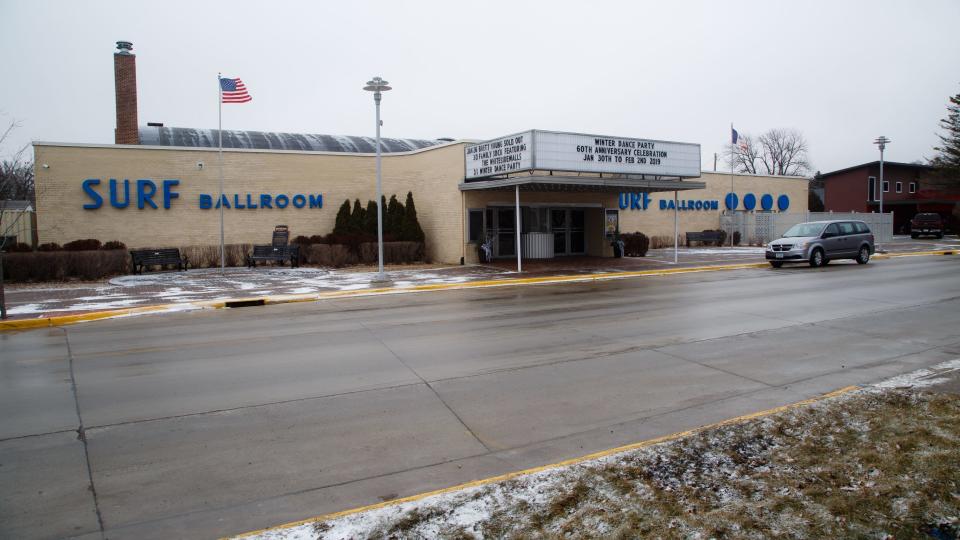From the archives: 'American Pie' isn't a song about Buddy Holly, Don McLean says: 'It's about America'
Editor's note: This story was originally published on Feb. 1, 2019, ahead of the 60th anniversary of the plane crash that killed Buddy Holly, Ritchie Valens and J.P. “the Big Bopper” Richardson, along with pilot Roger Peterson.
Sixty years ago this Sunday, just after 1 a.m., a plane carrying three rock 'n' roll stars and an Iowa pilot crashed into a frozen field north of Clear Lake, Iowa.
The impact killed all four immediately, changing the course of music for decades to come.
Across the country, a 13-year-old paperboy unfolded the next morning’s headlines to read words that’d leave him devastated.
Buddy Holly, J.P. “the Big Bopper” Richardson and Ritchie Valens died hours after striking a final note at the Surf Ballroom.
The news crushed Don McLean.
“I was crazy about Buddy Holly,” McLean, age 73, told the Register. “I was way into Buddy Holly. Something about him, really … he was my favorite. I listened to his records all the time.”

Twelve years later, McLean took pen to paper and delivered “American Pie,” an eight-and-a-half minute acoustic epic that’d become one of the most celebrated and debated songs in popular music.
The song opens by transporting listeners back to McLean’s 1959, to an America before the Beatles invaded Ed Sullivan and Vietnam War protests took over city blocks. “A long, long time ago,” he described it.
It’s in the first verse that he coined the Iowa crash with a name that would stick for decades to come.
“Something touched me deep inside the day the music died …”
More: Sorry, 'American Pie,' but the music didn't die in Clear Lake. Just ask the fans.
Leading into the 60th anniversary of “the day the music died,” the Register spoke with McLean about Buddy Holly, the song’s legacy and if he’ll one day return to the Surf Ballroom. Read below for excerpts from the interview.
Buddy Holly offers a jumping off point for the song, but “American Pie” isn’t about Holly, McLean said. He wrote the first verse in one sitting, later expanding the track into a rock 'n' roll epic capturing the loss of American innocence.
The first verse appeared like a “genie out of the bottle.”
"The song is not about Buddy Holly," he said. "It’s about America."
“Buddy Holly’s death is what I used to try to write the biggest possible song I could write about America. And not a ‘This Land Is Your Land’ or America, the Beautiful” or something like that. I wanted to write a song that was completely brand new in its perspective.”
He added: “(It was) this idea of being a rock 'n' roll dream, or a fantasy, of some sort. But it's a dream where things morph into other things.”
More: What you need to know about Buddy Holly and ‘the day the music died’ in Iowa
“The day the music died” initially refers to the plane crash, McLean said, but takes on “so many things” as the song progresses through six verses.
“The music is the poetry of life, it’s the spirit of something,” McLean said. “It’s the essence of art. It’s so many things. So, as the song develops after each verse, that music has died, you see? So I realize as a metaphor it was perfect for what I was thinking.”
What about innocence did McLean see being lost? He said you have to look at the time period to understand. Americans looked at rock ‘n’ roll in 1959 as something elementary, a fad for teenagers, McLean said.
“The church, the school, higher education, business,” McLean said, “this is what people were interested in. Not silly songs written for kids by guys with waterfall hairdos, jivin’ around on stage.”
In turn, he points to how drastically society changed in the 1960s as parallel to “American Pie.”
“You were coming to the very ugly end of the Vietnam War.” he said. “It had been building since the ‘60s. And at 1971, it was in its absolute peak. Riots in the streets. Cities on fire. This is the environment that was now happening, all right, in the United States, opposed to 1959.”
McLean played the Surf Ballroom in 1980. The site of Buddy Holly’s final show, he remembered being “quite impressed with the bizarre nature” of the venue.
During his visit, he penned hand-written lyrics to "American Pie” on the wall of the venue green room.
“It’s in the middle of a corn field,” he said. “I remember coming down the road, off the beaten path, and there were a lot of motels that looked like they were from the 1950s. Like nothing had changed too much.”
The Surf celebrates 1950s rock 'n' roll each year with the Winter Dance Party. Starting as a one-night show on the anniversary of the crash in 1979, the event’s expanded to four days and draws in attendence from across the globe.
Would McLean consider returning to play the Winter Dance?
“I’d be happy to do that,” he said.
This article originally appeared on Des Moines Register: What Don McLean says 'American Pie,' 'the day the music died' means

